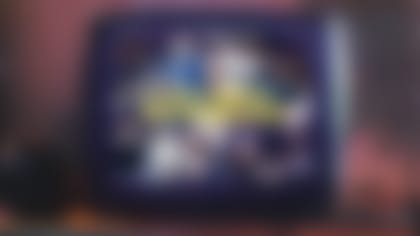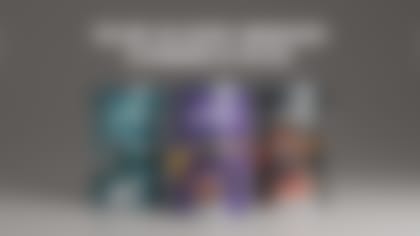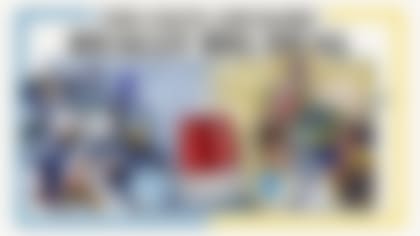Massive amounts of prep. Holidays at work. Career advice from Johnny Unitas. The ups, downs and absurdities of broadcasting football.
By Marc Sessler | Published Dec. 20, 2016
When I went to high school in the early 1990s, I didn't want to be a football player.
I wanted to be a sportscaster.
When I wasn't filling geometry notebooks with drawings of the NBC Sports logo -- the network I planned to work for someday -- I unapologetically walked the halls with a picture of Bob Costas tucked in my wallet. I was an obsessed nerd.
We had a student television station at my school -- Tiger TV -- that quickly became a haven from the stark reality of my sub-zero athletic skills and inability to drive a vehicle. I spent hundreds of hours alongside a maverick, beyond-his-years classmate, Chris Sprague, announcing everything we could think of: football, basketball and baseball games, music video countdowns, low-wattage cooking shows and the annual Memorial Day Parade -- with all of this overexuberant fodder broadcast, often live, on Channel 22 of our local cable provider. Sprague was play-by-play, I handled color. We viewed ourselves as 17-going-on-35, ready to ditch our schooling at any moment for the chance to announce real games -- the ones we saw Costas, Marv Albert and Al Michaels narrating weekly to fans nationwide.
Sprague and I went so far as to ditch a week of summer vacation to attend "Bill Raftery's Sports Announcers Camp" somewhere in the leafy hills of Pennsylvania. Nestled beside a five-star basketball camp, our small band of juvenile wannabe newsmen called a rash of games that were later critiqued by Raftery and legendary broadcaster Bob Wolff.
Our ramshackle game-calls starred players with no names or numbers on their jerseys: "Strong bounce pass from Red-Haired Point Guard to Lanky Tall Guy under the basket -- and LANKY TALL GUY PUTS IT DOWN!"
Needless to say, I did not become a professional play-by-play guy. Still, I remain fascinated with those who make a living calling the game. It will always double as a pocket infatuation for me, which made this project -- interviewing some of the great voices of today about what they do and how they do it -- a pure joy from start to finish.
I'll get out of the way now and let these men and women tell their stories:
HOW DO PLAY-BY-PLAY ANNOUNCERS PREPARE FOR A GAME?
Mike Tirico (Play-by-Play, NBC)
Your preparation starts the week before. ... You watch as much as you can. Certainly the entire prior game of the teams that you're going to have next week. And I try to watch the cut-down version of their prior couple of games to get a good sense of what's happened. And then it's reading and studying and watching other videos of them. Maybe a call to a contact that you have around the league, whether it's media in that city or it's a coach who just played against them. And then you get on site probably 48 hours before the game. You spend Friday with the home team -- their practice, their meetings -- and then Saturday when the visitors come in, you do the same deal with them. And then you get ready for Sunday. And the getting ready for Sunday is in some way, shape or form the production meetings with your own group.
Sean McDonough (Play-by-Play, ESPN)
For me, the preparation for this Monday's game (a Week 12 Packers-Eagles tilt) starts today on Wednesday. Today, I'll receive a packet from each team, and it will have their media guides and game notes and clippings and stats and all that stuff, and I'll also receive my spotting board. A lot of people make their own. I have a gentleman in Virginia who makes the shell for me with all the names and the numbers and the heights and weights and stats. I'm not very adept on the computer, and it's a big time-savings for me, and he lays it out. In fact, I get teased a little bit about the size of my spotting board. But he puts the names and numbers on it graphically, and then I write in all the notes that I want in the open spaces. That process begins today. Then I'll start watching, on NFL Game Pass, the most recent couple of games they've played and then maybe go back earlier in the year and watch little bits and pieces of some others to get a little sense of perspective maybe at how their team or rosters have changed during the year and how it's affected the way they've played.
Joe Buck (Play-by-Play, FOX)
I'll read the clips every day. ... And you're highlighting things, you're looking for trends, you're seeing, "Are they running the ball well these days?" Because you have to drop down in Week 13 like you've been watching Weeks 1 through 12 of each team -- and obviously we haven't. We've been doing other games in other cities. And I'm probably the least informed about what's gone on in a given Sunday by, pick a time, six o'clock Sunday night. I will have done my one game. I know everything there is to know about that game, but for the other ones that have gone on, I haven't seen anything yet. So I have to kind of play catchup on Monday and read about the other games and then zero in on the two teams I'm covering that week.
Jim Nantz (Play-by-Play, CBS)
I'm sitting here in California, and I've got my board set up here for Houston and Green Bay for the week. And I've seen Green Bay already twice and I saw Houston back on September the 22nd, and I'm going through my notes from the Houston game against New England back in September. I'm going through the notes of the two Green Bay games that I broadcast, making sure there's anything that's salvageable from that information that I wrote down. If it's been used on the air, I'm not going to reword it or come back to it again. I like to keep it fresh.
I mean, come on, I'm not worried about how a guy is pulling -- how a guard is pulling -- and kicking out an outside linebacker on a run. That's not my job. Joe Buck
Peter Schrager (Sideline Reporter, FOX)
I'm doing Saints-Bucs this weekend (Week 14). So what I'll do is, I'll go back and watch their last four games, both teams, so that's a lot of hours right there. And I'm not watching the Game Pass condensed, I'm watching the whole thing, because I want to see what the sideline reporters already reported. So if Jennifer Hale had done the Buccaneers two weeks ago and tells a great story about [Bucs receiver] Freddie Martino, I don't need to tell it again, because they've already heard it. If you're a Buccaneers fan, you've heard it, and who are you trying to show off for if it's already been done? It's finding the stuff that nobody knows.
To be brutally honest, I don't watch film. I'm there to cover the next game. I think I can create enough of a mental picture through all of the reading I do to know what went on. Filling my head with visual images of what went on the week before or three weeks prior, that's something Troy [Aikman] does. He's looking at who's blocking well, how teams are trying to get after a quarterback. But watching film is not a big part of my weekly preparation. And I don't know if that makes me different than the other play-by-play guys or if that makes me more honest. I mean, come on, I'm not worried about how a guy is pulling -- how a guard is pulling -- and kicking out an outside linebacker on a run. That's not my job.
Tracy Wolfson (Sideline Reporter, CBS)
I save a lot of articles Monday and Tuesday. Probably about Tuesday evening, I start preparing. Reading a lot, trying to find stories, anecdotes, the ins and the outs, the keys to the game. I don't have to memorize numbers and players as much as the guys do in the booth. I really have to focus on the stories and what the coaches are talking about and what their keys will be, and what the storylines are going into the game.
I'm not a guy that really watches a lot of tape. If I haven't seen a team, I like to see a game just to get an idea of what they look like on the field. Who sets up in most formations on what side, but I don't find it that beneficial to me. I'm not asked to break down the play. I'm a storyteller. So most of my preparation is about reading or interviewing people on the phone or in person. Trying to glean a few little interesting nuggets that haven't been told before.
Matt "Money" Smith(Play-by-Play, Compass Media)
NFL's not as hard as college. I've done a ton of college games. College is crazy. Because you're talking about 80 players at a coach's disposal -- and they'll use them. Like, when I would call Oregon games, I mean, you're talking about a defense that is rotating guys four, five deep in some positions, and you better be on top of it. So when you make your board, you've just got this massive collection of names that you're trying to keep track of. It was actually Oregon that got me to change the way I build my board. I used to build it by position, so imagine if you're looking at your board, if this is the defense, here I've got my defensive line, here in the middle I've got my linebackers and here I've got my cornerbacks and safeties. Well, from that point on, I still do that, but I was like, wait a minute, I'm doing two deeps and I don't really care who the starter and the backup is, I care about numbers. So now I just group things by numbers. ... Then I can just run my thumb up to No. 35. Otherwise, I was constantly like, "S---!" I don't even know how deep this player is, and it was just a mess.
I think how you organize your board is very important. At least to know where it is. I highlight the heck out of [ESPN researcher] Jim Carr's notes, and I'll write on my chart what page the information is about a player's notes, so rather than transpose everything Jim wrote about that player, I might just write "JC 3" -- then I know, OK, all the info that Jim wrote is on page 3 of his notes. I think everybody has their process that works for them. I tend to be more old-school and write things out by hand and try to read it over and over again. You hope that by the time the game starts, the pertinent things that you really want to make sure you get in are basically memorized.
As far as the boards, I make way too good of a living to rely on somebody making a couple hundred bucks to do my board and have a mistake come from anybody not named Joe Buck. … And that's how I learn it. By putting names and numbers on the board and physically writing down all these statistics. A) It puts it in my head. B) If it's not in my head, I know where it is on my board. I go into a Sunday and it's the biggest open-book test you've ever taken.
HOW DO COLOR ANALYSTS PREPARE FOR A GAME?
Phil Simms (Lead Analyst, CBS)
I'll watch more film now than I ever did as a player, and I probably study more now or put more time into it now than I did as a player. It takes painstaking work, and 98 percent of it is worthless. But I never know which 2 percent's going to count, so it's everything.
Coach [Jon] Gruden also sends us video clips every week. I believe last week there were 32 of them. I'm sure he's in the office now, in his bunker in Tampa, watching tape of these teams. And it's not just tape from this year. He has an amazing film archive. Some weeks, it probably takes four, five, six hours to get through all the video clips that he sends us. It's basically his breakdown of just about every position group on both teams and whatever else he thinks is interesting about the way they play or the way they coach.
Preparing for the game, watching tape, you read the stories, that's all good, but for me, the main crux is to know why and what they're doing. I love watching football on TV. And there's nothing worse than seeing a guy catch a touchdown, and I go, "Well, how did he get so open? Oh, I can't believe this! This is professional football. Show me the damn reason he gets open. I want to know why." That's the big thing. And it drives me crazy when I never see why.
Mike Mayock (Analyst, NFL Network)
Basically, Monday morning, I start with one of the two teams. For instance, if it was Tennessee, I'll start with their run game. And I'll watch the last two or three games, run game only. No passes. I get the NFL's coaches tape, not television copy. And I want to understand run game first, and I want to understand what the personnel groupings are, who gets the majority of carries, are they a tight end/fullback team, what does their I-formation run game look like versus their shotgun formation run game? Do they pull or are they a zone or a gap team? So, I'll go back and watch two or three games and get a really good feel for that. And then, if the two teams are in the same division and they've already played each other, I'll go back and watch the first game for sure. Then I'll do the same thing with the pass game, and take apart the pass game -- two, three, four games in a row to try and get a feel for what does their 11 personnel pass game look like versus their two-tight-end pass game versus their short-yardage or goal-line pass game. Who's their third, fourth and fifth wideouts and -- I'm trying to bang myself over the head with run games -- three or four games -- and pass games -- three or four games.
I'm doing Pittsburgh this week. And Alejandro Villanueva is their left tackle. And let's just say he's going against a speed rusher. Well, I'll look at the schedule and go, "Oh! Well, they played this team and they had a great speed rusher, let me see how he did." And I can get that up on my computer and just watch him and go through 40 plays in 10 minutes and go, "OK, I see how he dealt with that speed rusher." I'll know why he's good or bad or whatever.
I always do an interception reel on the quarterback. And I'll give you an example. Years ago, I did a playoff game. It was the "Beast Quake" game. Seattle-New Orleans. It was a phenomenal football game, and obviously, Marshawn Lynch took it over, but Drew Brees that season had an inordinate number of interceptions, and the talk around media circles was, "What's wrong with Drew Brees?" I forget how many there were, but the point is, I put together an interception reel of every single one and I showed it in our production meeting to our NBC guys, because I wanted them to see -- everybody's talking about Drew Brees having a bad year because of the interceptions. But if you really break it down, only a small percentage were on him. Some of them were wide receivers running wrong routes, some of them were a defensive lineman tipping the ball. Some were a tight end slipped and fell. If you really go through the whole thing, you get a real perspective as opposed to just what the numbers tell you.
Charles Davis (Color Analyst, FOX)
For me, it's a game or two. And I watch the All-22 and I watch the TV copy, because I like to see how other analysts are seeing the team. In the beginning, I tried to watch as much as I possibly could. I'd watch three or four games, if I could, depending on what part of the season you were in. And just go crazy that way. And then, [former coach and sportscaster] Mike Gottfried, who I consider an incredible friend and mentor, at one point he said to me, "Dude, you need to lighten up on your prep a little." He said, "You're fine on the prep." Bob Rathbun, the play-by-play guy for the Atlanta Hawks, he was the first one to tell me, "Lighten up on the prep." He said, "Because what happens is, you have so much prep in you, you're going to want to make sure you spill it all out there, and the game dictates whether you spill it out, not just you doing prep. If you do all this extra prep, there's a natural tendency to be like, 'Hey, I was up until 2 in the morning -- you're going to hear this.' And that's not always good for the broadcast."
Once I get past the nuts and bolts of, what's their pass game look like, what's their run game look like, you get into the specialty stuff, and it's the sack reel, it's the interception reel, it's the third-down reel. So once you get through all that, and it takes a lot of time, you kind of look back at 15, 18, 20 pages of notes and you go, "OK, out of all that stuff, what's important to the team this week?" Then I roll on the defense and it's really similar … and all of a sudden, you come out of it and you're kind of bleary-eyed. Like, holy crap, how do I take all of this and condense it down to two teams playing each other this week?
To watch a game like me -- I can tell you, I watched Pittsburgh's offense. And to watch just their offense in one game took an hour and 45 minutes. So, to think you're going to do five games. Well, you've got four sides of the ball. And then all of a sudden, you go, "I've got so much information, this is ridiculous." But then you start to narrow it down, learn a personality and learn the truth.
I like to pick up the phone and call contacts who have seen these teams. In college, I really relied on this. I would call the play-by-play or color analyst of each school's radio team, because nobody's going to have better information than they are. I would also pick up the phone and call a beat reporter that covers each team, and that's how I formed relationships. I would call them and tell them straight up what I was looking for if I didn't have a relationship with them before -- is it possible for us to start one?
Every team has a personality and a stamp on who they are. What is it? You don't get that through stats and reading articles. You do it by watching and really learning. So that part's fun. I really enjoy it, and what happens to you -- what happens is, you might go in and say, "Oh, wow, this team is this." And then after two days of studying them, you go, "Man, I was totally wrong. This team is this." Because what we show on the TV screen and what you read in the sports pages or listen to on talk radio -- I'm not saying it's wrong -- but it's headlines. That's all it is. It's not the truth.
HOW IMPORTANT IS CHEMISTRY IN THE BOOTH?
I think it's the most important thing. Two people are going to be talking, having a conversation while watching the game. For three-and-a-half hours. You better be able to connect. Sometimes, I think if we come to this as a professional, it's inherent on us as play-by-play guys to adjust our style to the analyst. I certainly would do a different broadcast with a college basketball analyst. Let's take Hubie Brown, who was my NBA partner for a long time. I'd approach a broadcast with Hubie different than I would with Jon Gruden.
I try and treat my play-by-play partner like I do anyone who's driving a car that I'm in. I want them the most comfortable. I want the seat adjusted the way they want it. I want whatever music on that they want to listen to, because they control the deal. They've got the wheel, and my life is kind of in their hands when they're driving. You can't fake chemistry, although some teams have done it quite successfully. But it's not fun if you're faking chemistry, so I really want to be friends with my play-by-play partner.
I think it comes through reps, I think it comes because of time, and I think it comes because of trust. [Troy Aikman's] legitimately one of my best friends. And it doesn't have to be that way. We don't have to be great friends. In fact, I think we're more the exception than the rule in broadcast booths, although I've never worked in a booth where I wasn't really good friends with the guy or guys that I'm working with. I don't know how that would be possible, because I'm only as good as he is, and vice versa.
I think chemistry develops over time. And I've already seen that with Jon. (This is McDonough's first season working on the "Monday Night Football" broadcasts.) I think at the beginning, if anything, the first couple games, I probably tried too hard to force it in terms of conversation, that sort of thing, and I think that's natural when you're new. But over time, I've stopped doing that, and we've just let the game naturally flow, and I think the chemistry's better and better every week as I get to know him better and he gets to know me -- and just the time on the air together. You get to know people's tendencies and habits and what they're comfortable saying or doing and what makes them uncomfortable.
We spend a lot of time together. Tracy [Wolfson], I can't tell you how many years she's been working the sideline with us, but it's been quite a while now. And with Phil [Simms], this is the 13th year. ... Somewhere around 300 games together. That's a lot. A lot of meetings. A lot of preparation. A lot of dinners two nights before, the night before. That's a lot of on-air broadcast time. That's over 900 hours of communicating with each other on the air ... you get the hang of it.
I think if you love football and you come to it from the same place, you understand what about the game that analyst can teach you for any sport, then I think you can create good chemistry. And I think that's the part that network TV executives sometimes, sometimes overlook.
Some of what we do on the air is built through dinners on Friday and Saturday. We all go out as a group on Friday and then on Saturday, Troy and I usually break off. ... [Sideline reporter] Erin [Andrews] will join every once in a while. And we'll talk about stuff that has nothing to do with football, but every once in a while, we'll veer back into football talk. We just did a Dallas game, and we were talking about the Dak Prescott-Tony Romo dynamic. And now Tony's the backup, obviously, and Dak's the starter and red-hot. And we talked about it before the game, and I said to Troy, "You know what? Let's just save it for on the air. I don't want to hear your opinion right now. I'd rather it be fresh." And I did it for a reason, I said, "I'd rather it be fresh when I hear it on-air with everybody else, so I can genuinely react to it. I don't want to overload you with what I think before we go into the game. Let's see how the game unfolds, let's see where this moment happens in our broadcast and let's just naturally react to a normal conversation, like we were sitting at the dinner table as much as we were in front of the audience, whatever it was, 35 million people." And that only comes with the trust I talked about.
WHAT GOES INTO GOOD SIDELINE REPORTING?
Michele Tafoya (Sideline Reporter, NBC)
I call Saturday night my school night. I don't go out that night. I stay in and I just write. I write because I'll usually have a hit in our pregame show, I'll have to prepare for my opening on camera, and anything that we've decided that is relevant to have prepared for the game. So it's just writing, writing, writing and then just physically putting my whole notebook together in a way that makes it easy to access. Sometimes you're given five seconds notice, 10 seconds notice before you have to be ready to go with a story, so you want to make sure it's accessible.
Really, the only thing I script is, basically, my first big story of the game. What are Jim and Phil not talking about that I can add? It could be an injury, it could be weather, it could be field conditions, it could be the state of the team, it could be a scheduling situation, whatever it might be that I can add to the game.
[FOX Sports director] Artie Kempner told me this: "You come to a game as a sideline reporter with a bucket of s---, which basically means you have a whole bucket of nuggets and stories and great backstories -- Ali Marpet is the first Division III player invited to the combine -- and then a game breaks out and you have to be willing to just keep the bucket of s--- in the bucket, because when someone's viewing, they don't really necessarily care what they read in some AP article on Tuesday, they care about what's happening right now, in this game." That was good advice.
I always just try to get from the field what the guys can't get in the booth, because that's the unique experience. It's the unique opportunity that sideline reporters have. For instance, when [Oakland Raiders quarterback] Derek Carr dislocated that pinky [in Week 12], I mean, I was right there when he was screaming at the top of his lungs. So, the look on his face, you're trying to portray that to the viewers.
When Bill Parcells was coaching at Dallas and Drew Bledsoe was his quarterback -- and this was on "Monday Night Football" -- and there was this kid named Tony Romo, who had been getting some reps in practice. And I remember saying that Bill, in our meeting, "Is Tony ready to go if you needed him?" And he said, "Yes, he is." And it was the way he said it. And no one else believed that Bill was going to put Tony in the game. I was working with Joe Theismann at the time. He's like, "There's no way he'd pull Bledsoe out of the game. Tony's not ready." Well Bledsoe threw two interceptions at halftime. I get over to Bill and he said, "I'm throwing Tony in." So it was Tony Romo's first-ever appearance for the Cowboys in this way. [Parcells] was benching Drew Bledsoe, and to get that on the air as your halftime report is really, really fun.
The P.R. staff, by design, is supposed to tell us if someone's injured, but they're not going to proactively, like, run to you and say, "Odell Beckham hurt himself!" You have to be on it, so I have to always be the eyes and ears and I have to see, "Is [Giants receiver Odell] Beckham grabbing his hand and coming off, and is he going to miss a play?" [That's what happened in the Cleveland game] and I was in in [Giants P.R. man] Pat Hanlon's ear, saying, "What's wrong with Odell? What's wrong with Odell?" And he'll say, "I'm working on it. I'll get it for you." And I'll say, "He's grabbing his thumb." And then he says to me, "Yup, he's coming back, but it was his thumb." And then I can go to air with it.
You're supposed to go to the P.R. person. Every NFL team is required to give you the information. That is not how it works. Certain teams are better with it than others, so you really -- and I learned this from my college days, where they don't really give you anything, and you have to rely a lot on your eyes and ears and relationships that you have -- you really have to seek it yourself, and then use the P.R. guy as the backup. But you can't go on the air saying it's a calf injury if they haven't told you it's a calf injury. You can go on the air and say, "I saw them working on his calf, but the Oakland Raiders will not give us the information." You really have to put it into context, but the scrambling part comes when you're on one side of the field and the injury's taking place on the other side of the field.
I'm on both sidelines. I'm constantly on text with whoever's on the sideline for the P.R. department of both teams, and I'm constantly walking one side to the other. So, if you see, at a game, the sideline reporter walking around and going place to place to place, it's not because he's being frantic or bored, it's because you've got to position yourself in the best way possible. Whatever team's on offense, I go on that side, but if a defensive player's injured, at the stoppage of play, I'll run over to the other sideline -- so it's a great workout.
The problem for us is, yes, you want to make sure you get the information out there quicker than Twitter gets it out there. It kills me if I have the injury information and we can't get it in our broadcast yet. It just bothers me. But you have to remember that you're also broadcasting to an audience that a lot of people who aren't on Twitter and aren't following your game on Twitter, so while it bothers me, it kind of shouldn't, because we're still broadcasting to a big audience -- and that's the whole importance of it.
Let Twitter speculate, let Twitter go nuts. Let's not be the one to report it wrong because Twitter has it and we feel the need to get something out there.
Sometimes you'll get the comment, "Oh, you're really late on that." Yeah, I'm late on it just because of the circumstances of the game. We're not going to get an injury report when you're inside the 10 going for a touchdown. It doesn't make sense. I would be mad if they came down to me, unless it's an important injury. The whole point is to watch the game, right? I don't want to get in the way. I don't want them to miss a play because I'm talking over it -- or them to miss a call.
HOW DO YOU FIND BALANCE BETWEEN WORK AND LIFE, WHEN HOLIDAYS ARE WORK DAYS AND TRAVEL IS NONSTOP?
My dad (acclaimed radio man Jack Buck) and I were best friends. I have nothing but admiration and love for the way I grew up and the closeness we had, but he was gone a lot. And I made a pact with myself that whenever I could, I was going to be home and around my two daughters. Now, as we sit here in 2016, my daughters are 20 and 16, one's in college and one's a junior in high school. They have their own things going on, so it's not like they're little children. But when they were little, there were Fridays with my production team that I would miss. And there were times when I would get there on Saturday if there was a father-daughter dance or if they had a big game or a swim meet or whatever. And like any other line of work, you make it up. And Troy told me early on, "I know you're going to be ready. If you miss a Friday practice, so what? I'll take notes." And he's one of the best note-takers of anyone I've ever been around. So, I can catch up.
I'm a little different. In our family, my kids, my wife, everybody involved -- they're glad I'm not here on holidays ... because they know I'm doing something important to our life. And that's how they view it. They're glad. We get tons of time together. So, yeah, would I like to be home for Thanksgiving dinner? Yes. But also, it's pretty damn cool that they can sit down and wait until my game is over to have Thanksgiving Day dinner and watch me and on and on. This is the life that we lead. My kids ... both of my sons, one is at Bleacher Report. The other son is still playing, he's with the Atlanta Falcons, and my daughter, her husband, we're all involved in football.
When I'm home, I really try to be home. And all the prep work that I'm doing during the week while I'm home, I try to do during the school hours, so when I pick them up at 3:15, I'm ready to be Mom and give them everything they need.
You have to have -- it's so great to have -- incredible support from your family. They understand what comes with the job. ... You do the things you need to do. You celebrate Christmas on different days and odd days. And we've opened up gifts on FaceTime on Christmas morning over the last few years. So you make the most of it and you are constantly reminding yourself that what we do, it's not that much of a burden. There are small inconveniences, but we're not working construction, we're not protecting the country, we're not first-responders, we're being compensated quite generously to be given a good seat at a great sporting event to describe it to people who choose to open their houses for us to come in and entertain them, via their TV.
[My kids are] bummed when I travel. Because I work two jobs, five days a week, Monday through Friday, I'm [at NFL Network] in the morning, I'm at the radio show (Petros and Money) in the afternoon, so I don't have breakfast with them when it's football season. I rarely get home in time for dinner, because I'm off the air at seven. So when I'm also out on a Friday night or a Saturday for the weekend, yeah, they're bummed.
I learned from a psychologist friend of mine years ago, lamenting to him about being gone and what I was doing to my kids and all that. He just kind of stopped me and said, "Alright, here's the deal." He said, "It has to be a balance, because there's absolutely nothing worse than a parent who never shows for anything their kids do. That's pretty simple, right? You get that." He said, "You know what else is horrible? Parents who don't miss anything their kids do." I said, "What? How's that horrible?" He said, "They quickly get the idea that they are the center of the universe. Try raising that child. ... If you miss a few things, they find out that what you do is important for your family as well."
I tell every woman that wants to get into this business and who wants to have a family and wants to have kids -- because that's certainly my No. 1 priority -- just remember, it changes. You have to be able to handle being away on holidays, on birthdays, when your kid is in a play. When you're missing their championship soccer game, whatever it may be, you're going to miss those events. And you work around it. Fortunately, my husband is extremely supportive, and we've learned how to handle it. My kids are very used to it. They know when I'm going to be gone. They know that I'm not going to be there. They know that my mother might step in to watch his play instead of me, or the babysitter might be taking him to the championship basketball game because neither one of us -- my husband works full-time, too -- might be able to be there. ... I think you surround yourself with really good people and really good help.
Sports seize the times when people are not working, so that's weekends, that's holidays. You're asking about Christmas and Thanksgiving, but you're not asking me about Easter, Memorial Day, Independence Day, Labor Day -- you gotta remember, I do three major sporting events. So you name a holiday and I'm working it. So my family, I can't say you ever embrace it, but we understand that's the way it is. We love our job. I'm never going to complain about the opportunity and the gift I've been given to be able to broadcast these sporting events.
I think where I found out it became special this year, which is really strange for everyone, was when I was lucky enough to [do the color commentary on "Madden NFL 17"]. So this is the first time, I think, that I got like cool cred from my 18-year-old son. I've never seen him react like that before. I've been lucky enough to call three BCS National Championship Games, seven BCS bowls when you count those games. I've called NFL games, I've done the Super Bowl three or four times on the international feed, you get the idea. Couple of those things are kind of cool, right? Never that reaction until, "Hey, you're not going to believe this, kids. I'm going to be one of the voices of Madden." And he flipped out. And he and his friends flipped out. Like, they knew me, and that was kind of cool. But the Madden thing? I'm getting hugs from his boys. His boys are dropping by the house, "Mr. D! That is so cool!" And it just tells you, whatever hits and whatever works.
WHEN DID YOU KNOW YOU WANTED TO BE A BROADCASTER?
Eleven years old. I dreamt about it since I was a little kid. Fascinated by the voices I heard on the weekends coming into my living room. We didn't have around-the-clock sports coverage like we do today. You waited all week long for the weekends to roll around so you could watch sporting events, and I hung on every word and knew since I was a little boy that this was exactly what I wanted to do.
The people in my life from an early age would say that, as a kid, I was more interested in the announcers than the game. I would go around mimicking the announcers, and when I had the opportunity to be around sports, I was more excited to meet the broadcasters than the players. … I think as an athlete, when I quickly became a pinch runner and a defensive replacement in early baseball, I realized I wasn't going to live out the dream of playing for the Mets, so here we go. And the next best way was to be part of the media, and that was the initial seed. And then after that, honestly, my guys were Marv Albert and Bob Costas. Those were the people who I thought were just awesome at what they did, and I wanted to be like them, and that's a large part of why I went to Syracuse and started this odyssey.
I didn't go to Syracuse, I didn't go to Missouri, I didn't go to Northwestern ... I was a political science major at Emory University. I wrote for the school paper and I just wrote, wrote, wrote, wrote, and I loved writing, and I loved the story behind the story, so my favorite thing was going to Senior Bowl or combine and telling the Ali Marpet story -- there's a kid here from Hobart -- and I think there's always a place in the broadcast for that.
My earliest memories are of being a young boy, probably 5, 6 years old, when my dad (Will McDonough) was covering the Red Sox. We would go to spring training down in Winter Haven, Florida, with him and hang around, get home-schooled in the morning and then go to Chain of Lakes Park where the Red Sox had their spring training in the afternoon. My dad would have to sit in the press box and cover the games, so a lot of times he'd stash me in the Red Sox radio booth and I'd sit there and I'd watch their announcers broadcast the games. … I had a little tape recorder and I'd lie on the floor in the living room of our house and I'd start broadcasting every game I could off the TV.
It's not fun if you're faking chemistry, so I really want to be friends with my play-by-play partner. Charles Davis
As I was making my way through high school and college and intended to go into politics and law, I would just routinely hear, "God, that voice. You're going to be on the radio. You're going to be an announcer." That kind of led me to do student radio, and I love music, so I got an internship in the music business at PolyGram. That led me to KROQ, here in L.A., and I did some on-air stuff and ended up doing sports for them and it all just kind of kept working from there.
I probably had some idea in college. I thought it would be kind of cool to do, but I didn't really pursue it, to put it mildly. I went into the working world, or what have you, but then I got a break where someone called me from FOX Sports South and it came totally out of the blue. As it turned out, someone I had gone to college with had recommended me two years prior. So this other guy called me two years later when he was in a desperate spot because he couldn't get anyone to take these two football games. And that's really how it got started. I did the first game and I think it's probably a lot like when you do something and go, "Man, that was fun. I'd like to do more of that."
You know, my dad was kind enough to take me around to sporting events often in my teen years. And my goal, when I would go to a golf tournament or a basketball game, was to get as close as I could to the commentators who were calling it. I just wanted to catch a glimpse. Or to see them. I'd heard them so many times, I actually wanted to see them. They were bigger stars in my life than the athletes who were competing. That was just me. And I was so truly 100 percent in awe of this, obsessed with it, that they became a really big part of my life. And I would run around a golf course and stand underneath the announcing tower and strain to see -- I could hear, just faintly hear them call the action.
TALK ABOUT THE EARLY UPS AND DOWNS IN THE BOOTH
It wasn't football, but my first-ever play-by-play gig was the Pac-12 basketball tournament with Petros Papadakis as my color analyst -- a football player! But we were doing a basketball game, and I'll never forget it, because Barry Tompkins, you know, a longtime play-by-play voice -- who was Petros' football partner on TV in the booth -- came over, and we were chatting and stuff, and he's like, "Hey, listen, man, it's your first time, you're going to do great. You're a sharp guy, you'll be fine. You just follow the action, you talk about the action, what's so hard about that?" And he wasn't being a smart-ass. He took like four steps down the stairs from where we were broadcasting from and he turns around and he goes, "Wait a minute, are you doing ... radio?" And I'm like, "Yeah." And he goes, "Oh my God! You're f---ed!"
I was right there when he was screaming at the top of his lungs. So, the look on his face, you're trying to portray that to the viewers. Tracy Wolfson
The first game I ever did was Memphis State at Mississippi State at 3 o'clock Central time, middle of the afternoon, 3,000 degrees, and you know what really triggers it for me? That first game, unfortunately, was the same day/night (in August 1997) that Princess Di got killed. So I will always have that burned in. I did the game and went back to the place I was staying and then ended up all night with CNN on the perpetual loop about Princess Di on the crash, she's in grave condition, the whole deal.
Charles Davis is one of my best friends. He and I always talk about how we kind of grew up in the industry in the same way. Before we knew each other, I admired his work, he admired my work and we had never met. And we were both pedestrian defensive backs that had no significant NFL career, so people kept telling us we'd never be analysts. We'd have to go do play-by-play or be a host, but you can't be an analyst because you don't have a big enough name. Both of us got hit over the head for years and years with that, so we probably had to accept more assignments and do more things than just about anybody you know of that's done a national game. And I'll give you an example: When I was just getting into it, I was doing games for New Jersey Network as a sideline reporter and that was basically Rutgers and Princeton. And I couldn't even get in the booth. I was the sideline guy interviewing mascots.
When I got that first job, I said, "OK, where do I get the training? Who's going to talk to me about it?" And the person kind of chuckled and said, "Here's where you show up and the producer will go over some stuff," and I was like: "What do I wear? What do I do?" All the questions. And, essentially, it's like, when I was kid, I read a book about the Vikings -- not the football team -- and how did they teach their children to swim? Took them down to the water's edge and threw them in. And that's essentially what it was. A baptism.
I did CFL games, I did college games -- and by the way, I was working full-time in commercial real estate and raising kids -- so, if you don't love it, you've got no shot at it ... I might have done 35 to 40 football games one year because I vividly remember coming back from Calgary, Canada -- this was before cellphones -- and you'd have a layover in Dallas, or wherever, and you'd call back home for messages and all of a sudden there was a message: "Can you get to State College for the Iowa-Penn State game?" This was after doing a Thursday night game in Calgary, and instead of going home, I would go straight from that airport to State College (Pennsylvania) to go call a Saturday game for Penn State. It was crazy.
The second game I did was UCF at South Carolina. The reason I tell you this was, after the game was over, I was heading to the elevator and I met Johnny Unitas. His son was a walk-on at South Carolina, and he was watching the game. He was very friendly, and I was starstruck, I was awestruck. He struck up a conversation with me, he said, "Hey, you're dressed awful nice, what are you doing here today?" I told him what I was doing, and he said, "Ah, OK, you having fun?" I said, "It's my second game ever, Mr. Unitas. I'm loving it and I hope I get a chance to do more." He said, "Hey, you want a little piece of advice?" I said, "Sure." It's Johnny Unitas! And in a nutshell, he told me the story of his broadcasting experience. We all know he was a Hall of Fame player. He did three years of analyst work for CBS and, at the end of the three years, they didn't renew his contract. And he said, "Back then, you didn't have a lot of agents and, you know, I kind of had a little bit of [pull] and I called the president and said I wanted to meet with him and went to New York and said, 'What's the deal? Every game I do, everyone tells me I did a nice job, they love what I did. Way to go, pro. Way to go, 19.' And the president looked at me and said, 'They were lying to you.' I said, 'What?' He said, 'They were lying to you. Nobody wanted to tell Johnny Unitas you weren't very good.' " And he said he looked at the president and said, "Well, in that case, if you're the one in charge of this, you're doing a really lousy job, because anyone who would let people just do that, and not coach them to get better, and you allow that to go out on the air, that's on you." And Unitas told him: "I'm a quarterback, I've played my whole life. You think I didn't get graded and coached and critiqued?" ... So Unitas told me: "Young fella, if you want to stay in this business, you've got to find someone who's going to tell you the truth and someone who's going to coach you along. 'Cause they didn't do that with me and I don't want you to make the same mistake."
LIKE FATHER, LIKE SON
Joe Buck is the son of iconic radio voice Jack Buck. Sean McDonough is the son of legendary sportswriter and broadcaster Will McDonough. We asked both what that father-son connection meant to their decision to follow suit.
The job was different back then. There was no internet. It was before Al Gore invented it. My dad had to really rely on personal contacts to get information that he couldn't get through the media releases. So he had a network of people and coaches he'd talk to. Bill Parcells was a guy that he really leaned on -- especially when he was doing Giants games -- for trends in the league and, specifically, what was going on with that team. I don't think he was alone in that. I think my dad had a pretty good relationship with pretty much every coach in the NFL at the time, because he bothered to go down there, introduce himself and ask questions.
I've said many times, and it's true, that some of the best memories of my childhood are of watching "Monday Night Football" with my dad. You know, sitting there and listening to him talk about the game -- kind of engaging us in conversation about the games. I think that's why my brothers and I all became analytical thinkers about sports, because he would make us think about the game. I don't know if he was doing it intentionally, or he just wanted somebody to talk to while he was watching the game. We'd sit there and he'd wonder out loud why they were running the ball on that play or why the referee threw the flag on that play or whatever it is he was thinking about. It was just fun, you'd look forward to Monday night. Mostly because you knew it was going to be time spent with your dad.
What I saw was a guy who sat at our kitchen table putting together his boards by hand. ... He was putting it together with felt-tip markers and pretty rudimentary homework and preparation that you just kind of went in and did it. He kind of flew by the seat of his pants. This is not the kind of world where flying by the seat of your pants works very often, so there's a little more preparation that I'm doing during the course of the week. And he was juggling a lot of different types of jobs at the time, so I don't know if he had the free time or freedom to put into his prep for one game a week that I do. ... But personally speaking, I try to combine what he did, which was a little fly-by-the-seat-of-your-pants, with the preparation that I think most guys do in today's broadcast world.
If it wasn't for my experience of growing up around my dad, I'd probably be doing something else.
WHAT GOES THROUGH YOUR MIND IN THE BOOTH?
I tell people every week, when I'm standing there in that booth and I have the headset on and all of a sudden that iconic theme music starts playing, that I still get a jolt of electricity through my body and a real adrenaline rush. I stand there and think, I can't believe I'm actually doing this.
You just always feel like, "Oh, I hope I get it all done." And when you get it all done, it's just an unbelievable satisfaction. You're going, "Hurry up and kick this thing off because I've got a lot of stuff I want to talk about." Especially when you know you have something that nobody's talked about.
I try to take pride in helping people get a better understanding for the game that I love. There's a fine line, and you mentioned it, which is talking over [people's heads] sometimes. And if people want to be critical of me, they can say that, "Hey, Mayock uses terms we don't know," or whatever. But I've worked really, really hard at trying to make sure I defined whatever terminology I used. And it can be difficult, because you get -- if you're lucky -- you get 12 to 15 seconds in between a play to highlight why a play did or didn't work.
Let Twitter speculate, let Twitter go nuts. Let's not be the one to report it wrong because Twitter has it and we feel the need to get something out there. Peter Schrager
I'm a big first-guesser. And [Jim's] along with me. I'm not afraid to, and I do it a lot, to question going for two, fourth downs, I always give an opinion. And it's usually very strong. And I'll bring Jim into it: "Jim, what would you do?" I love it. And he'll give his opinion, too. And he'll disagree with me, too. I go, "Alright." That's what it's about. Usually, there's no definitive right or wrong.
My philosophy is that we should be there to enhance the viewer's enjoyment of the game and not detract from it.
When you watch somebody, and they know the rules inside out, then it really cuts down on the guessing time ... So, I try to spend as much time on it as possible. Poor [NFL vice president of officiating] Dean Blandino, I probably email or text him once a week with the silly what-if questions -- "So, if an extra point gets blocked, and then on the return this happens, let me just make sure this is right, Dean" -- and I just keep a file of stuff, and I go back and review it on a regular basis. I can't for a second pretend that I understand everything about it, but I just want to be conversant in the rules, so if the moment happens, I can at least have a little bit of a clue.
I'm in love with everything about it. The process of being prepared for the games. The actual unfolding of the games, the playing of the games, the three hours when we're on the air and applying our work and our week's worth of preparation -- it's a blur. It's fantastic. I love it. I love it. Now, when you're a kid -- as I mentioned, the stars for me were the broadcasters. Now, what you're rooting for is a good show. For the ability to see this great orchestration come together in concert with a snappy, clean, beautiful perfection. Those are the victories that we celebrate today.
WHAT ADVICE WOULD YOU GIVE SOMEONE TRYING TO BREAK IN?
Preparation. You have to really have a desire to want to do it and want to be really good and be very critical of your own work, because this is a job that there is no bar exam for. You're hired very often by the enjoyment of your style from the one person who's doing the hiring, so you can't think, "Do this, this and this and you'll get the job."
I always tell young women, don't look at yourself and say, "I'm a female sports reporter." Just say, "I'm a sports reporter."
We're all drooling to get Brett Favre in the booth and listen to him talk. Peyton Manning, they'd probably break the bank for. If you have aspirations for that, the better player you are, the better shot you have. Now, the one thing you have to be careful of is, you're starting at a super-high level. So your mistakes are really glaring. When you start like me when you're a nobody, and you beat the bushes and you call high school games and Pop Warner games and Little League baseball and women's volleyball and the whole thing. You're doing that on a regional basis and you're making mistakes and it's not really the same glare. I don't have [Sports Illustrated media reporter] Richard Deitsch climbing all over me when I'm calling a Division II women's basketball game, but it gives me a chance to get my reps without that. If you're at the highest level, you get dinged right from the start. That's my first advice to them, but my second is, most of us aren't going to be at that level: So you gotta work.
You better really like football.












